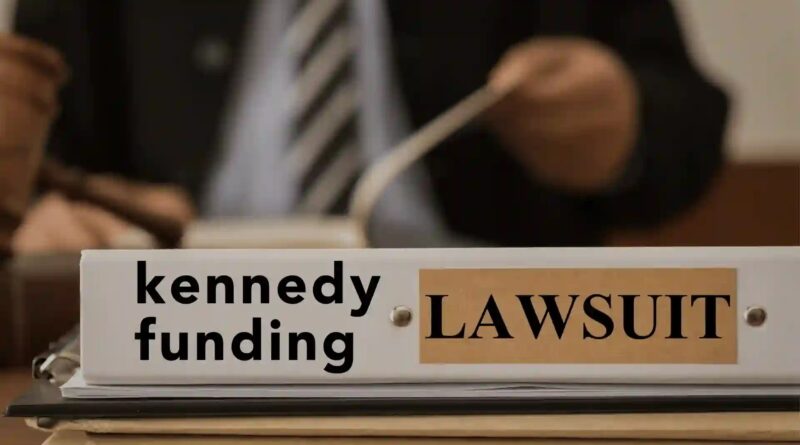Introduction to the Kennedy Funding Lawsuit
The Kennedy Funding lawsuit has emerged as a significant legal case, attracting widespread attention for its implications in the financial and legal communities. This case centers around Kennedy Funding, a firm known for its innovative funding solutions and investment strategies. Founded by its eponymous figure, the company has facilitated numerous financial transactions, primarily focused on real estate and commercial projects. However, the nature of its financial dealings has come under scrutiny, leading to legal action that has caught the eye of industry stakeholders and the media alike.
The lawsuit originates from allegations that Kennedy Funding engaged in practices that may have violated various financial regulations. Accusations include claims of misleading investors, failing to disclose critical information, and mismanagement of funds. As a result, stakeholders and individuals who invested with Kennedy Funding are seeking redress and clarity regarding their investments, prompting further examination of the company’s operations. This legal matter is notable not only for the potential financial ramifications for the company but also for the broader questions it raises about compliance and ethical practices within the funding industry.
As the case unfolds, it continues to be a focal point of interest for legal experts, investors, and the general public. This lawsuit has been characterized by the intricate details involved in financial agreements and the responsibilities that come with managing investor funds. The outcome of the Kennedy Funding lawsuit may set precedents affecting similar cases in the future. Understanding the intricate relationships between the parties involved will be crucial for comprehending the ripple effects this lawsuit could have on financial practices and regulations going forward.
Background of Kennedy Funding

Kennedy Funding is a private lending institution that specializes in offering financing solutions primarily for real estate ventures. Established in 1996, the company has built a reputation in the financial sector by providing quick access to capital for various projects, including commercial properties and developmental ventures. Their business model centers on what is known as “hard money lending,” whereby loans are secured by the real estate asset itself rather than traditional credit checks. This allows for faster transactions and greater flexibility, which has attracted a range of clients from developers to property investors.
The services provided by Kennedy Funding include bridge loans, commercial property financing, and other forms of short-term loans tailored to meet the needs of real estate professionals. By focusing on niche markets, Kennedy Funding has been able to serve clients who may not qualify for conventional financing through traditional banks. This approach not only fulfills immediate funding requirements but also positions the company distinctively within the competitive landscape of private lending.
<pdespite about=”” and=”” anyone=”” attention=”” awareness=”” background=”” been=”” borrowers=”” both=”” business=”” by=”” challenges=”” company’s=”” company.=”” concerns=”” conditions,=”” current=”” drawing=”” especially=”” essential=”” faced=”” for=”” funding=”” funding.
Details of the Lawsuit

The Kennedy Funding lawsuit has garnered attention due to its intricate nature and the high stakes involved. This legal action involves multiple parties, prominently including Kennedy Funding, a financial services firm, and a group of lenders who have raised concerns surrounding contractual obligations and ethical practices. At its core, the lawsuit asserts that Kennedy Funding allegedly failed to adhere to the agreed-upon terms when it came to loan agreements, which has led to significant financial ramifications for the plaintiffs.
The primary legal claims emerging from the lawsuit focus on breach of contract and fraudulent misrepresentation. The lenders contend that Kennedy Funding engaged in deceptive practices, which not only undermined the integrity of their financial agreements but also manipulated the expectations held by the lenders regarding the returns on investment. Understanding these claims is essential, as they reflect broader concerns about accountability within the financial services industry.
The timeline of events that precipitated the Kennedy Funding lawsuit is equally crucial in grasping the complexity of this case. Initial allegations surfaced in early 2023, when multiple lenders began to voice their grievances about unmet financial commitments. As further investigations unfolded, these concerns escalated into formal legal action by mid-2023. Important milestones during this period included discovery phases where evidence was exchanged, followed by pre-trial motions that addressed various procedural issues integral to the case.
Moreover, the lawsuit’s proceedings illuminated key allegations regarding the mismanagement of funds and lack of transparency that compounded the situation for affected parties. The ongoing developments in the case serve as a poignant reminder of the intricate dynamics between financial entities and their clients. As it progresses, the Kennedy Funding lawsuit may have significant implications for industry practices and regulatory scrutiny in the financial sector.
Key Players and Stakeholders

The Kennedy Funding lawsuit involves a multitude of participants who play crucial roles in the progression and implications of the case. At its core, the key players can be categorized into plaintiffs, defendants, legal representatives, and various institutions that hold vested interests in the outcome of the lawsuit.
First and foremost, the plaintiffs are significant stakeholders in this situation. They are individuals or entities that have initiated the lawsuit, seeking compensation or resolution for grievances allegedly stemming from actions related to Kennedy Funding. Their motivations often relate to financial damages, contract disputes, or breaches of trust, which have prompted them to seek legal redress. The plaintiffs’ interests are closely aligned with achieving a favorable judgment that would validate their claims and rectify any alleged wrongs.
On the other side, the defendants in the Kennedy Funding lawsuit consist of individuals and organizations accused of misconduct or failure to meet obligations. These defendants have a keen interest in defending their actions and reputations, as the lawsuit poses potential risks not only to their financial interests but also to their professional credibility and standing in the industry. Their legal representation plays an essential role in articulating the defense strategy and navigating the complexities of the case.
Legal counsel for both sides also constitutes an essential player in the lawsuit. Lawyers representing the plaintiffs work to build a compelling case, gathering evidence and presenting arguments that bolster their clients’ positions. Conversely, attorneys for the defendants devise strategies to refute claims and mitigate the implications of the lawsuit. Their expertise is pivotal in shaping the proceedings and outcomes.
Lastly, various institutions, including regulatory agencies and financial entities affected by the lawsuit, have a stake in its resolution. Their interests might be linked to the regulatory environment or economic consequences associated with the actions of the key players. Together, all these participants create a complex network of interests that must be navigated throughout the Kennedy Funding lawsuit.
Legal Implications and Consequences

The Kennedy Funding lawsuit has surfaced as a significant legal matter that encapsulates various implications for the parties involved and the broader industry. At its core, the lawsuit may result in financial repercussions, regulatory scrutiny, and reputational damage, which could have a lasting effect on the businesses and individuals entangled in the case. The outcomes of such a lawsuit typically depend on the court’s rulings, the arguments presented, and the evidentiary support provided by both sides.
The potential for financial consequences is substantial. Depending on the findings of the court, parties could face monetary penalties or be required to pay damages to affected stakeholders. This can not only affect the immediate finances of the entities involved in the lawsuit but may also influence their future funding capabilities, particularly in an industry already facing significant regulatory challenges. This aspect is crucial because the outcomes of the Kennedy Funding lawsuit may set striking precedents for other firms seeking funding or entering similar legal disputes.
Moreover, the ramifications could extend beyond financial penalties to include stricter regulatory frameworks and heightened compliance requirements. If the court finds substantial evidence of impropriety or unethical practices within the funding operations, it may prompt regulatory bodies to enact tighter controls and guidelines in the finance and funding sectors. This would influence how companies approach funding in the future, possibly stifling innovation and altering business models that depend on this form of capital.
From a broader perspective, the Kennedy Funding lawsuit illustrates a critical juncture in the evolving legal landscape, wherein the intersections of funding practices and regulatory oversight are continuously tested. As the legal proceedings unfold, the implications may pave the way for more stringent policies and increased vigilance in financial operations, marking a pivotal moment in this sector.
Public and Media Reaction

The Kennedy Funding lawsuit has garnered significant attention from both the media and the public since its inception. Coverage of the case ranges from detailed analysis in legal journals to sensational headlines in tabloid media. The portrayal of the lawsuit in various outlets indicates a multifaceted approach to the story, often emphasizing its financial and legal implications. Major news networks and investigative reports have focused on the complexities surrounding the claims made against Kennedy Funding, shedding light on the intricate financial dealings that are central to the case.
Public opinion regarding the Kennedy Funding lawsuit appears to be polarized. Some view the litigation as a necessary measure to hold businesses accountable for their financial practices, while others are skeptical of the motivations behind the lawsuit, questioning the timing and the parties involved. The legal proceedings have sparked discussions on social media platforms, where users express their opinions and share personal stories related to the financial sector. This trend illustrates a growing awareness of the repercussions such lawsuits can have on investor confidence and company reputation.
The media response has sometimes been characterized by a focus on the personalities involved, which can detract from the substantive issues at hand. The portrayal of key figures within Kennedy Funding has varied, with some outlets depicting them as controversial players within the financial landscape. This has influenced public sentiment, as individuals often form opinions based on the character and reputation of those at the center of the lawsuit. As the legal process unfolds, ongoing media coverage will likely continue to shape perceptions surrounding the Kennedy Funding lawsuit and its broader implications within the finance industry.
Expert Opinions and Analysis

The Kennedy funding lawsuit has garnered significant attention within both legal and financial circles, prompting various experts to weigh in on its implications. Legal analysts have noted that the lawsuit could set a precedent for future cases involving similar funding disputes. Some attorneys specializing in financial law suggest that the case might challenge the boundaries of existing financial regulations, potentially reshaping the landscape for investment funding and enforcement protocols.
Industry analysts are particularly intrigued by the financial intricacies surrounding the dispute. They argue that the nature of the Kennedy funding lawsuit could impact investor confidence, particularly in emerging and alternative financing sectors. According to these analysts, if the lawsuit results in unfavorable outcomes for the parties involved, it could discourage potential investors who might shy away from similar funding ventures due to perceived risks. In contrast, a favorable ruling could promote stability and encourage more robust funding avenues in the financial sector.
Additionally, some financial experts have commented on the importance of transparency and due diligence in funding endeavors, underscoring that the lawsuit underscores the necessity of adequate vetting processes. They believe that the case serves as a vital reminder for both investors and funding entities to adhere to strict compliance measures to mitigate risks of litigation. Furthermore, the ramifications of the Kennedy funding lawsuit extend beyond its immediate context, as the rulings could influence legislative discussions on financial regulations and investor protections.
In conclusion, the diverse perspectives shared by legal professionals and industry analysts shed light on the potential impacts of the Kennedy funding lawsuit. These insights not only help in understanding the case’s significance but also highlight the broader implications for the financial industry as a whole.
Lessons Learned from the Lawsuit

The Kennedy Funding lawsuit serves as a pivotal case study in the realm of corporate governance and legal practices. One of the primary lessons gleaned from this situation is the heightened importance of transparency in business operations. Companies are increasingly held accountable for their actions, and this case illustrates the necessity for firms to maintain clear and open communication with stakeholders, including investors. Clear disclosures can preempt misunderstandings and foster trust between a company and its investors, thereby minimizing the risks of litigation.
Furthermore, the Kennedy Funding lawsuit highlights the significance of corporate responsibility. Businesses must recognize their ethical obligations not only to their shareholders but also to the broader community. Companies that demonstrate a commitment to ethical practices and responsible management are more likely to retain investor confidence, as shown through the scrutiny faced by Kennedy Funding. Firm adherence to ethical guidelines helps in mitigating risks associated with legal disputes, ultimately benefiting both the firm and its investors.
Investor rights are also a crucial component underscored by this case. It serves as a reminder for investors to remain vigilant and informed about their rights within corporate structures. Investors should ensure that they have a thorough understanding of how their funds are managed and the associated risks. Additionally, the case demonstrates the importance of seeking legal counsel when entering investment agreements to safeguard one’s interests.
In conclusion, the Kennedy Funding lawsuit provides valuable insights into the legal landscape surrounding corporate operations. It underscores the importance of transparency, corporate responsibility, and the rights of investors. By absorbing these lessons, companies can better navigate the complexities of modern business practices and work toward sustainable and ethical growth.
Future Developments to Watch
The Kennedy funding lawsuit has garnered significant attention, and as the case continues to unfold, several future developments warrant close monitoring. As legal proceedings progress, outcomes may hinge on various factors, including the strength of evidence presented by both sides and any shifts in legal strategy. Stakeholders, particularly investors and financial institutions involved, should remain vigilant as the lawsuit evolves.
One potential development to observe is the possibility of settlement negotiations. Many legal disputes, especially those concerning financial practices and funding disputes, may reach a resolution outside of court. A settlement could alleviate protracted litigation and lead to an agreement beneficial for parties involved. If the parties can come to a consensus, the implications for stakeholders could be significant, as the resolution might provide clarity regarding the funding at the heart of the case.
Additionally, the implications of any court rulings throughout the proceedings may set important legal precedents regarding funding regulations and liability. Watch for any motions or rulings that could either strengthen or challenge the current interpretations of financial law as they pertain to the central issues in the Kennedy funding lawsuit. These decisions could influence future similar cases and provide insight into how funding agreements are evaluated legally.
While the context of the involved parties may impact legal strategies, it is essential to remember that changes in public opinion or regulatory environments could also play a role in shaping the case’s trajectory. The ongoing scrutiny from the media and public stakeholders could pressure parties to approach resolutions in ways that could influence future funding practices. Ultimately, as developments emerge, sustaining awareness of the Kennedy funding lawsuit’s implications will be crucial for all involved.






